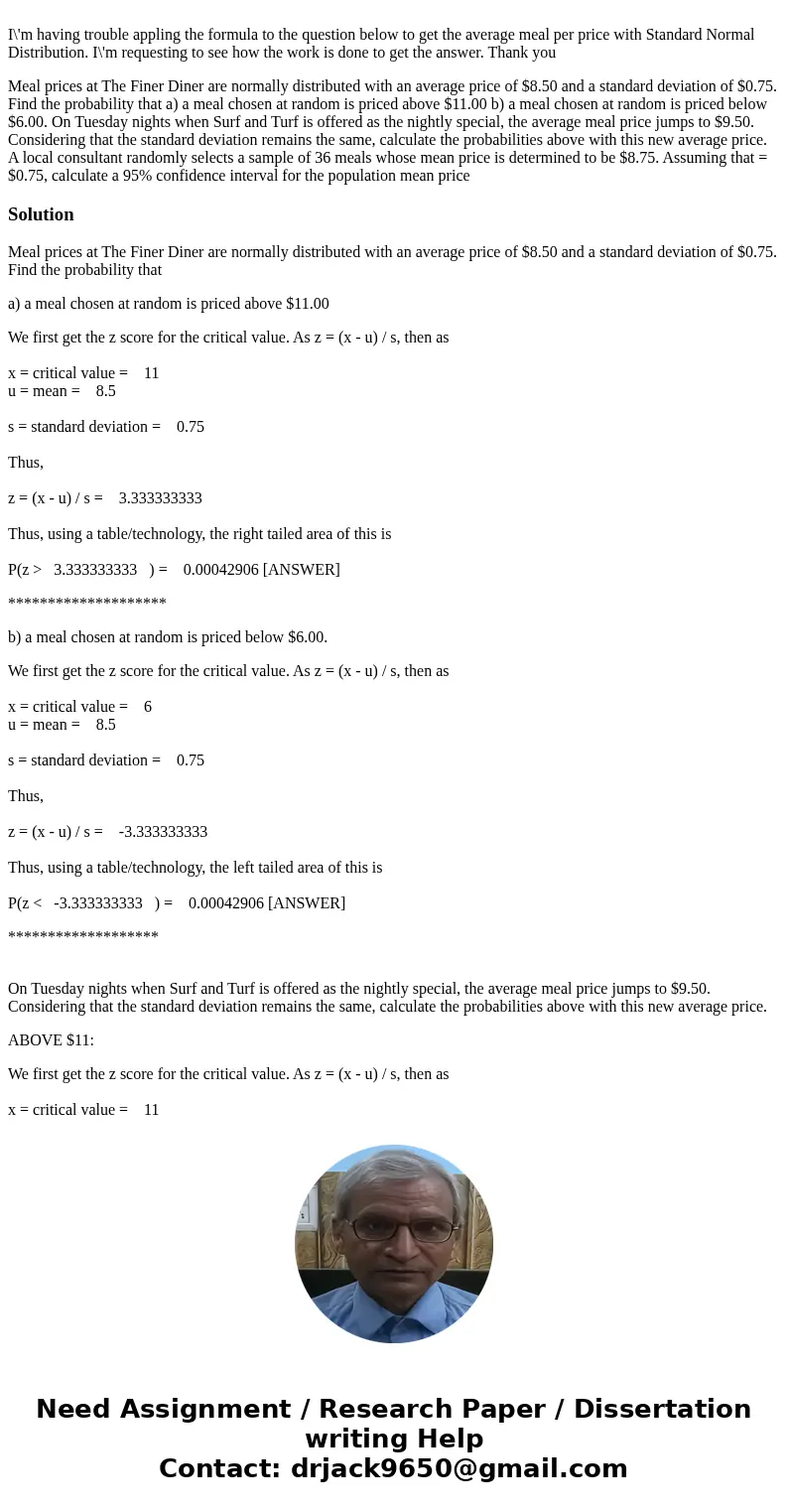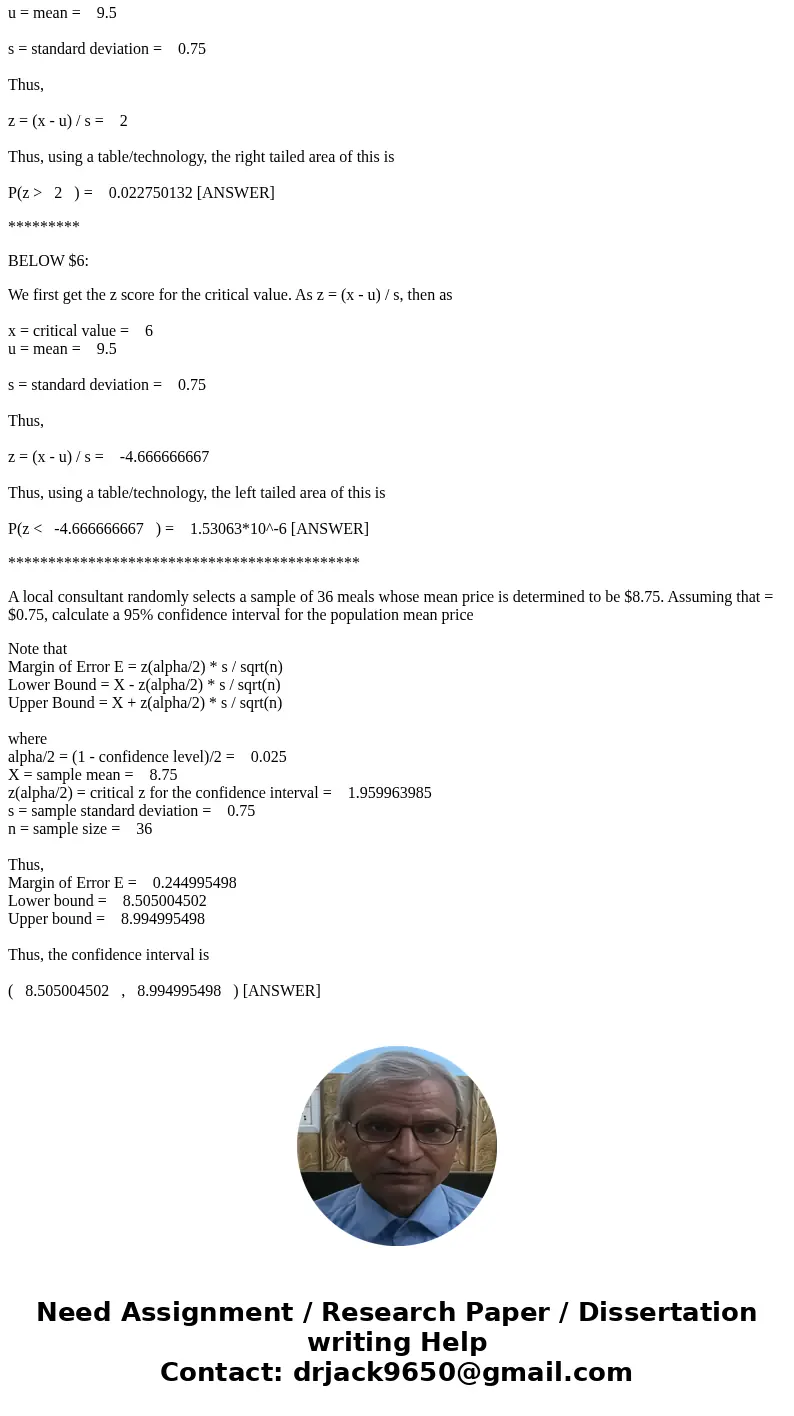Im having trouble appling the formula to the question below
I\'m having trouble appling the formula to the question below to get the average meal per price with Standard Normal Distribution. I\'m requesting to see how the work is done to get the answer. Thank you
Meal prices at The Finer Diner are normally distributed with an average price of $8.50 and a standard deviation of $0.75. Find the probability that a) a meal chosen at random is priced above $11.00 b) a meal chosen at random is priced below $6.00. On Tuesday nights when Surf and Turf is offered as the nightly special, the average meal price jumps to $9.50. Considering that the standard deviation remains the same, calculate the probabilities above with this new average price. A local consultant randomly selects a sample of 36 meals whose mean price is determined to be $8.75. Assuming that = $0.75, calculate a 95% confidence interval for the population mean price
Solution
Meal prices at The Finer Diner are normally distributed with an average price of $8.50 and a standard deviation of $0.75. Find the probability that
a) a meal chosen at random is priced above $11.00
We first get the z score for the critical value. As z = (x - u) / s, then as
x = critical value = 11
u = mean = 8.5
s = standard deviation = 0.75
Thus,
z = (x - u) / s = 3.333333333
Thus, using a table/technology, the right tailed area of this is
P(z > 3.333333333 ) = 0.00042906 [ANSWER]
********************
b) a meal chosen at random is priced below $6.00.
We first get the z score for the critical value. As z = (x - u) / s, then as
x = critical value = 6
u = mean = 8.5
s = standard deviation = 0.75
Thus,
z = (x - u) / s = -3.333333333
Thus, using a table/technology, the left tailed area of this is
P(z < -3.333333333 ) = 0.00042906 [ANSWER]
*******************
On Tuesday nights when Surf and Turf is offered as the nightly special, the average meal price jumps to $9.50. Considering that the standard deviation remains the same, calculate the probabilities above with this new average price.
ABOVE $11:
We first get the z score for the critical value. As z = (x - u) / s, then as
x = critical value = 11
u = mean = 9.5
s = standard deviation = 0.75
Thus,
z = (x - u) / s = 2
Thus, using a table/technology, the right tailed area of this is
P(z > 2 ) = 0.022750132 [ANSWER]
*********
BELOW $6:
We first get the z score for the critical value. As z = (x - u) / s, then as
x = critical value = 6
u = mean = 9.5
s = standard deviation = 0.75
Thus,
z = (x - u) / s = -4.666666667
Thus, using a table/technology, the left tailed area of this is
P(z < -4.666666667 ) = 1.53063*10^-6 [ANSWER]
********************************************
A local consultant randomly selects a sample of 36 meals whose mean price is determined to be $8.75. Assuming that = $0.75, calculate a 95% confidence interval for the population mean price
Note that
Margin of Error E = z(alpha/2) * s / sqrt(n)
Lower Bound = X - z(alpha/2) * s / sqrt(n)
Upper Bound = X + z(alpha/2) * s / sqrt(n)
where
alpha/2 = (1 - confidence level)/2 = 0.025
X = sample mean = 8.75
z(alpha/2) = critical z for the confidence interval = 1.959963985
s = sample standard deviation = 0.75
n = sample size = 36
Thus,
Margin of Error E = 0.244995498
Lower bound = 8.505004502
Upper bound = 8.994995498
Thus, the confidence interval is
( 8.505004502 , 8.994995498 ) [ANSWER]


 Homework Sourse
Homework Sourse